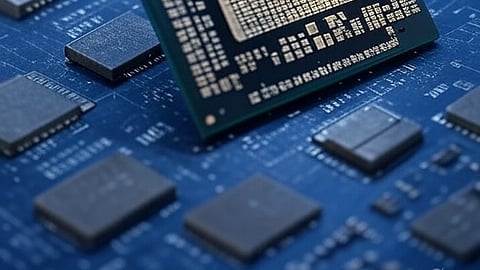

Intel, a struggling U.S. chipmaker, received a $2 billion equity investment from Japan’s SoftBank Group, announced on Monday, marking a significant step in its turnaround efforts.
This investment, which grants SoftBank just under a 2% stake in Intel, positions the Japanese firm as the sixth-largest shareholder, according to LSEG data.
Concurrently, reports indicate the U.S. government is considering a 10% stake in Intel, potentially making it the largest shareholder.
These developments underscore Intel’s critical role in U.S. semiconductor manufacturing amid growing competition and financial challenges.
SoftBank’s $2 billion investment involves purchasing Intel common stock at $23 per share, slightly below Monday’s closing price of $23.66.
This move aligns with SoftBank’s broader focus on AI and semiconductor assets, including its $500 billion Stargate datacenter project and a $30 billion commitment to OpenAI.
Masayoshi Son, SoftBank’s CEO, stated, “This strategic investment reflects our belief that advanced semiconductor manufacturing and supply will further expand in the United States, with Intel playing a critical role.”
The investment does not include a board seat or a commitment to purchase Intel’s chips, focusing solely on equity.
The U.S. government’s consideration of a 10% stake in Intel, potentially worth $10.4 billion, involves converting grants from the CHIPS and Science Act into equity.
U.S. Treasury Secretary Scott Bessent noted, “The stake would be a conversion of the grants and maybe increase the investment into Intel to help stabilize the company for chip production here in the U.S.”
This follows discussions between Intel CEO Lip-Bu Tan and President Donald Trump, prompted by concerns over Tan’s past ties to Chinese firms.
The government’s interest reflects Intel’s strategic importance in domestic chip production.
Intel faces significant hurdles, including a $18.8 billion loss in 2024, its first since 1986, as it struggles to compete with rivals like AMD and TSMC.
Its contract manufacturing business has failed to gain traction, prompting considerations of strategic shifts to attract major customers.
SoftBank’s investment, while a vote of confidence, is seen as insufficient to fully address Intel’s challenges.
Analyst Danni Hewson from AJ Bell remarked that Intel’s position as a key U.S. semiconductor manufacturer holds strategic significance, but operational and financial recovery remains a critical challenge.